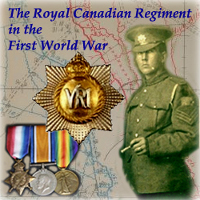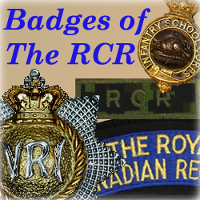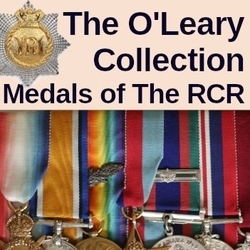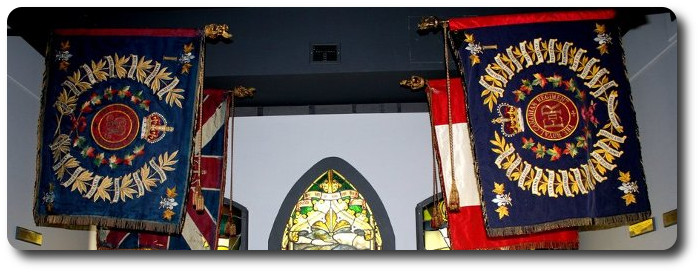
Researching The Royal Canadian Regiment
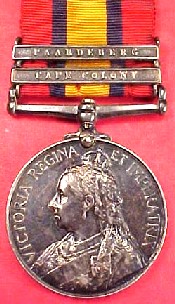
The Queen's South Africa Medal, awarded to all who served in South Africa between 11 October 1899 and 31 May 1902. There were 3,860 medals awarded to Canadians.
SOUTH AFRICAN WAR ANECDOTES
Canadian Army Journal, Vol 16, No 4, Fall 1962
[The following items are contributed by Dr. A.S. McCormick, who fought with The Royal Canadian Regiment in the South African War and who now lives in Canton, Ohio. They are from memoirs he is presently writing. Referring to the first excerpt, the author writes that he was prompted to send it to the Journal after reading the item "Canadians on Famous Marches" which appeared in this periodical (see page 21, Vol. XVI No. 3, 1963). - Editor.]
The Longest March
It is 16 August 1900 and we are somewhere in the Transvaal. We have been marching an average of 17 miles every day. Today we start out, but after going two miles, we return to the camp we had left an hour ago. We have a good rest all day. At midnight, I am posted as sentry over The Royal Canadian Regiment water-cart, with orders that none is to be allowed to draw water from it.
Now it is August 17th and at 2 a.m. the camp is aroused, wagons loaded, and at 2.30 we start on the march. The RCR is rearguard. We tramp for five hours through the darkness. Daylight comes, the air grows warmer and we remove our overcoats. A halt of 10 minutes every hour is the rule. Whether this is obeyed by the Battalion I do not know. I do know that the sturdy mules pulling the watercart never halt and I must keep up with them. The other battalions in the brigade are: 1st Battalion, Derbyshire Regt.; 2nd Battalion, Dublin Fusiliers; 1st Battalion, Somerset Light Infantry; 2nd Battalion, Northumberland Fusiliers. The commander is Major-General Fitzroy Hart.
The sun comes up and now we come to hills, hills, hills. Up and down we go, the mules still doing their part, and I still beside that confounded watercart. We catch up with Major Oscar Pelletier, a small man who says: "If the men must walk, so will I," and he does not use his horse. He is pale and tired and this arouses my repertoire of intensive profanity and I surely curse the man who is so cruelly leading this terrible march. The Major says nothing, but later in our correspondence after the war he wrote: "That was the toughest day the Battalion ever had." So it is mile after mile, hour after hour, with no stop for me.
About 11:30 we the cart and I - turn to go around a kopje ("Koppy") and lo and behold! - the brigade has halted. The driver whips his mules and gallops to the camp while I, like a hysterical old woman, shout: "You may gallop to hell for all I care." I have been on sentry-go for 11 hours and have walked 30 miles without stopping and I am in a very bad humour. I tell the corporal: "I have been sentry over that bloody water-cart for eleven and one- half hours. Now you relieve me damned quick." He does.
When I sit down with the other men of the guard, I start to remove my boots and someone says: "You can't remove your boots while on guard." I am beyond all caring what we may or may not do after my ordeal and say: "I don't give a damn, I have walked 30 miles without stopping and am taking off my boots."
Lieut.-Colonel Otter, who is sitting by his cart and very tired, hears me and for once he shows some consideration and sends word that the guards remove their boots.
For two hours exhausted men straggle in, drop everything and lie down. At four we start out again but after going a mile the heliograph signals to return to the camp. Then we learn that we had been on the way to relieve Zeerust near Mafeking, which was besieged by the Boers and that another column had arrived and raised the siege. Thus, General Hart whom I had been cursing was merely obeying the orders he had received. After a good night's rest, we start for Krugersdorp which we reach in four days by fairly easy marches. There we left the Brigade and were sent by train to Pretoria. What happens after does not form part of the story about "The Longest March". That day, however, the profanity I turned loose equalled any I ever used during the next ten years. But that 30-mile march was the longest in the Regiment's history and one of its toughest days.
The Three Musketeers
It is June 1900, and the First Provisional Battalion is in Kroonstad, Orange Free State. It is composed of men who have been left behind because of illness or wounds. Eventually the battalion will catch up with the main body and the men will rejoin their regiments.
No. 5 Company is composed of 17 members of The Royal Canadian Regiment under Corporal A.S. McCormick, 25 Gordon Highlanders under Corporal Buggins, and 40 Duke of Cornwall's Light Infantry.
It is an easy life: no drill, no duties - just be available for any call. Food is a tiresome repetition of the same old thing. So Lance-Corporal Mc Donald of Halifax, N.S., Pte. Woodcliffe of London, Ontario, and I decide to do something about it. At 10 p.m. with everyone else in bed, we set out on our expedition. We cross the dam over the Valch River and go to a supply depot on the far side of the town. We stop far enough from the depot not to be seen by the sentries.
Woodcliffe scouts around to see the layout. Then when the two sentries have met, turned about, and started back along the beat, he darts in and grabs a box and hurries to join McDonald and me. In the dark we make out the label "biscuits" - hardtack, the last thing anyone would select for a change of diet. "Blasted old biscuits," exclaims Woodcliffe and he makes another raid. This time he brings a box with 12 two-pound tins of Bruce's Army and Navy rations a lovely stew. Now my Corporal's stripes do their part. The two men shoulder the boxes and I march them through the streets as a fatigue party. We pass two or three men in whose hearing I angrily say: "This is a fine time to send out a fatigue party!" We stop to rest.
Through the darkness looms a figure with slow and measured tread. Looks like a police man, confound it. If it be a military policeman, he is about to see three men make a new world record for the mile. My heart is in my throat and if I cough, I am likely to spit it out. But we wait, the figure approaches, peers into each face and moves on. It is a Kaffir policeman. We breathe again. We continue the march.
In camp, we open the boxes and divide the loot. A Gordon sticks his head out of his blanket tent, we beckon to him and when he approaches, hand him a tin. "J----," he says and goes back to his tent. Happy over a brave deed carried out in the manner worthy of the best traditions of The Royal Canadian Regiment, we sleep like innocent babes. And as long as the food lasts we live happily. But in the long history of The RCR, no men were ever so frightened as we three when that policeman approached. Had our thievery been discovered, it would have been just too bad for the Three Musketeers.
